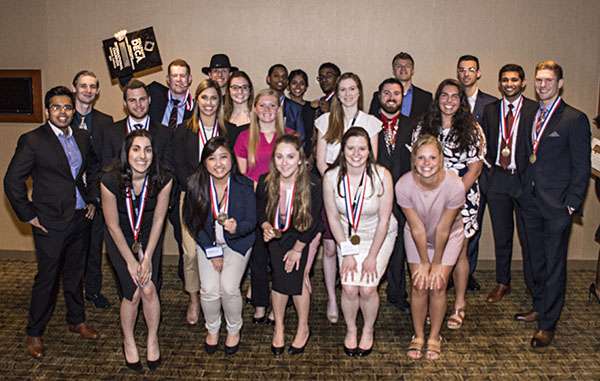
“For me and the other Kettering students to do so well, it shows that the Kettering experience is making a difference and it’s being recognized at these competitions on an international level.”
Kettering University DECA students made an impressive showing at the International Career Development Conference last month in Anaheim, CA.
Kettering University had the largest Michigan team with 24 students and 14 of those students were finalists winning medallions. Calloway Salmon ‘20 placed first internationally in the “Entrepreneurship: Growing Your Business” category and Harschal Patel ‘18 was a DECA scholarship recipient.
“There was 1,500 students at the competition representing 165 chapters from 29 states, Canada, Puerto Rico, United Kingdom and China. The Michigan delegation was the third largest and out of the Michigan delegation, Kettering was the largest,” said Dr. Ken Williams, assistant professor in the School of Management and faculty advisor of Kettering’s DECA team. “The students did an extraordinary job. I’m extremely proud of them.”
There are more than 15,000 Collegiate DECA members on 250 campuses across the world. DECA is designed to prepare students to be emerging leaders and entrepreneurs in marketing, finance, hospitality and management.
Kettering students were tested on their interview skills and resumes, role-played as industry professionals and did case studies with problem solving. There was also prepared events in front of judges where students present a business plan for entrepreneurship, how to grow their small business or create an advertising plan for a product, for example.

For Salmon, this is his second time at the international DECA competition and his second time earning a first place award. He has been part of DECA since he was in high school and for him the experience has been very worth it.
“Winning it last year was kind of a shock. Repeating this year in a different category was very rewarding. The work I have been putting into school and work is paying off, and proves that the education at Kettering is worth it,” Salmon said. “For me and the other Kettering students to do so well, it shows that the Kettering experience is making a difference and it’s being recognized at these competitions on an international level. DECA is truly a real world simulation of the professional work environment and Kettering students have that experience of being in a professional atmosphere as a freshmen student.”
Majoring in Mechanical Engineering while gaining a Business background through DECA is very valuable to Salmon.
“Students are able to grow their communications skills and become confident presenting in front of business leaders and company executives,” he said. “Engineering is a great place to start your career, but not all engineers want to be engineers their entire lives. You will need a business background to move up in a company. DECA provides these practice opportunities, and challenges you to think differently in a short amount of time, while learning how to properly and quickly present your ideas and findings.”
Williams said many students on the Kettering DECA team are not Business majors. It’s bringing together the best of both worlds - engineering and business. It’s a great way to create future leaders, he said.
Patel, who is an Industrial Engineering major, knows his DECA and Kettering experience go hand in hand. And Kettering’s success at the competition shouldn’t be a surprise.
“A STEM undergraduate education combined with the enriching experiences that DECA provides opens more doors to the future. I think that it is incredibly powerful when you are able to combine an engineering and business education,” Patel said. “I would say that Kettering students are naturally able to present themselves in a professional manner due to their co-op experiences. As a result of this, they are also able to develop a greater business acumen to help aid in future endeavors.”
Kettering students have used their skills well not only at the competition but in school and during their co-op experiences, Williams said.
“I did expect them to do well. What surprises me is that probably half of our students in the DECA group are freshmen or this is their first DECA experience,” Williams said. “That’s a pretty big deal. Many of them made it to national and then they made it to be a top 10 finalist. That says that not only did they know the subject matter and the event they were competing in, they knew how to present. They knew how to work in a team. They knew how to critically think on their feet and think quickly.”